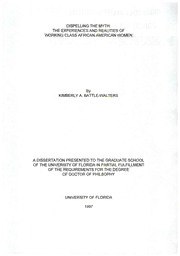
Dispelling the myth : the experiences and realities of working class African American women PDF
Preview Dispelling the myth : the experiences and realities of working class African American women
DISPELLINGTHEMYTH: THEEXPERIENCESANDREALITIESOF WORKINGCLASSAFRICANAMERICANWOMEN By KIMBERLYA.BATTLE-WALTERS ADISSERTATIONPRESENTEDTOTHEGRADUATESCHOOL OFTHEUNIVERSITYOFFLORIDAINPARTIALFULFILLMENT OFTHEREQUIREMENTSFORTHEDEGREE OFDOCTOROFPHILSOPHY UNIVERSITYOFFLORIDA 1997 Copyright1997 by KimberlyA.Battle-Waiters ACKNOWLEDGMENTS First and foremost, I give all glory and honor to God for making this degreeandexperiencepossible. IfithadnotbeenfortheLord,whowasonmy side,Iwouldnothavecometothisvictoriouspoint. Second, I would liketothank mycommitteechair, Dr. Joe Feagin, and committeemembersDr.FelixBerardo,Dr.HernanVera,Dr.ConstanceShehan, and Dr. Delores James fortheir timeless support, help, and patience. Their commitmenttoexcellencechallengedmetogivemybest. Ithankthemfortheir supportbothinsideandoutsideoftheclassroom. WhenItaughtatthecommunitycollegelevel,mymentorsDr.KarenCole SmithandDrewHurleyfromSantaFeCommunityCollegeweremajorblessings. Many thanks also go to the Graduate Minority Office for working behind the scenes to find funding, such as the SFCC/UF Black Faculty fellowship, for studentslikemyself. ThereweremanypeopleonthesidelinesthatquietlycheeredmeonthatI would liketothankaswell. PastorJoeMcCulloughandtheGainesvilleFourth AvenueChurchofGodfamilyconsistentlyprayedformeandmadesureIate. Iwillnotforgettheirkindnesstome, northebarbecuechicken, beans,greens, andcornbreadthattheyfed me. SisterOraMcClellanandSisterFannieMae Woodberry started this feeding trend. I also thank my faithful prayer partner Tanya“Faith”McCulloughforencouragingmethroughtheword,whenIbecame discouragedandtired. Aspecial thanks goesto the participants ofthis study. Thesewomen sharedtheirlifeexperiencescandidly,allowingmetheopportunitytogathersuch richdata. Iwould also liketothanktheadministration, staff, and facultyatAzusa PacificUniversityfortheirencouragementandsupportduringthefinalstagesof mydissertation. Warm thanks gotothe United Church ofThe Living God, friends, and familyfortheirsupportand prayers. Togethertheygenerously purchased my expensivecapandgown! Finally, IwouldliketothankmyparentsRandallandJanetWalters,who toldmethatIcoulddoanything,evenwhenIthoughtIcouldnot,andmysisters Tessla,Ericka,andRhandi,whocheeredmeonfromthesidelines. Eventssuch asthe nightthatmymotherdrovefortwo hourstomyhouseto help me read throughmydissertation,stayedupwithmeallnight,andthenreturnedtoherjob the nextmorning afteronlysleepingfortwo hourswill notbeforgotten! This greataccomplishmentwastrulyagroupeffort! IV TABLEOFCONTENTS page ACKNOWLEDGEMENTS iii ABSTRACT viii CHAPTERS ONE INTRODUCTION 1 TheLiterature 3 BeautyShopLiterature 5 PurposeoftheStudy 10 CentralParadigmandTheoreticalConcepts 12 Summary 16 TWO METHODS 18 ResearchQuestions 19 QualitativeMethods 20 DemographicProfile 23 WorkingClassStatus 24 TheCommunity 24 TheExtendedCaseMethod 25 Summary 26 THREESHEILA’SSHOP 28 ParticipantObservation 28 TheShop 28 TheWomen 30 BeautyShopCulture 34 TheMiracleWorker 34 TheWait 35 ShopTalk 35 TheChair 39 PricesandProcedures 41 FeministViews 43 v Summary 45 FOUR THEREALITIESOFBEINGBLACKANDFEMALE 47 TheExperience 48 GenderedRacismLiterature 52 StrugglesandChallenges 56 WomenandWelfare 60 WelfareIdeologies 62 MediaImages 66 BlackandWhiteWomen 69 OneWord 71 TheoreticalConclusions 73 Summary 75 FIVE AFRICANAMERICANFAMILIESANDCOMMUNITIES 76 Families 76 FamilyLiterature 80 BlackCommunities 85 Strengths 85 Weaknesses 87 BiggestThreat 88 Relationships 89 TheoreticalConclusions 92 Summary 93 SIX RACEMATTERS 96 AMatterofColor 96 Discrimination 101 DiscriminationLiterature 105 AffirmativeAction 107 ArgumentsonAffirmativeAction 110 TheoreticalConclusions 113 Summary 114 SEVENSTANDINGSTRONG 115 FamilyTies 115 DependenceandInterdependence 117 ChurchandGod 119 OtherOutlets 122 Goals 123 TheoreticalConclusions 127 Summary 128 VI EIGHT SUMMARY,DISCUSSION,ANDCONCLUSION 129 Summation 129 Findings 130 TheoreticalConcepts 138 TheExtendedCaseMethodRevisited 140 NewTheory 141 FutureStudies 144 REFERENCES 145 APPENDIXAINTERVIEWQUESTIONS 153 APPENDIXBDEMOGRAPHICS 156 APPENDIXCDATAANALYSISANDCODING 159 BIOGRAPHICALSKETCH 161 vii AbstractofDissertationPresentedtotheGraduateSchool oftheUniversityofFloridainPartialFulfillmentoftheRequirements fortheDegreeofDoctorofPhilosophy DISPELLINGTHEMYTH: THEEXPERIENCESANDREALITIES OFWORKINGCLASSAFRICANAMERICANWOMEN By KimberlyA.Battle-Waiters December1997 Chairman: Dr.JoeR.Feagin MajorDepartment: Sociology Aplethoraofscholarlyliteraturehasbeenwrittenexaminingthelivesof poorAfricanAmericanwomenand,morerecently,middleclassAfricanAmerican women. Unfortunately, working class African American women have been largelyignored. Inthisdissertationtheindividualandcollectivelivesofworking classAfricanAmericanwomenareexamined, aswellastheirexperiencesand realities. To facilitatethis, a sample oftwentywomen was selected and studied within a southern beauty shop setting. Using a combination of qualitative methods, bothface-to-faceinterviewsanda participantobservationstudywere done. Through a face-to-face process, the women discussed and debunked stereotypesandnegativeimagesthathadbeensociallyembellished. viii They also discussed issues of race and gender, the status of black families and communities, their support networks, and their political and economicconcerns. Threeracialrelationstheoretical conceptswereusedtoanalyzethedata. Theywere“gendered racism,”“cumulativelivedexperiences,”and “thehabitof surviving.” Thesetheoreticalconceptswereused inthecontextofinterpreting and understanding the lived experiences ofthese women, as they related to racial,gender,andclassstruggles. The effectiveness of these existing theoretical concepts in helping us understandthelivesofthesewomenwasmeasuredbyanevaluativeresearch method known as the extended case method. This method was used to examinethestrengthsandweaknessesofexistingtheoreticalconcepts,asthey related to this study. After using this method, new theoretical insights were given, intended to act as a catalystforfuture studies forthis segment ofthe population. IX CHAPTERONE INTRODUCTION Toolittleattentionhasbeendevotedtotherealworking-classstatusof Blackwomen.(Hine,1992,p.127) There is a scarcity of scholarly literature that describes the life experiencesofworkingclassAfricanAmerican1 women. Muchoftheliterature focuses on the “pathologies” of poor urban African Americans, reinforcing stereotypicalimages(Moynihan,1965;Murray,1984;Hernstein&Murray, 1994). Other works showcase the achievements or progress of African Americans, thereby playing down racial inequities altogether (Wattenburg & Scammon, 1973;Glazer,1975). Studiesthat citethe plightofblackwomen on welfare have been well cited in both scholarly and popular literatures (Jarrett, 1994 & 1996; Caputo, 1993; Quadagno, 1994; Seccombeetal., 1996). These imagesofthesingle black mother often remain vividly etched in our minds, while images of successfulworkingclassAfricanAmericanwomenarenoteasilyfound. Scholarlyworksthatexaminethe blackmiddle-classexperienceofboth menandwomen,suchasLivingwithRacism byFeaginandSikes(1994)and TheRageofaPrivilegedClass (1993)byEllisCose, exist. Studiesthatfocus exclusivelyon theexperiencesof blackwomenarerelativelyrare(Scott, 1989; Essed,1990;Benjamin,1991;St.Jean&Feagin,1996). 1ThetermsAfricanAmericanandblackareusedinterchangeablythroughoutthisstudy. Both termsareusedtodescribepeopleofAfricandescent. However,thetermblackisinclusiveof peopleofAfricandescentthatarenotnecessarilyfromAmerica. 1
